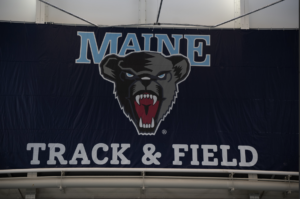The first of a line of NHL-caliber goaltenders to grace the University of Maine, Jimmy Howard and his run to the 2003-04 Frozen Four will live on in Black Bears history for the rest of time. After spending three years in Orono and cementing himself as the all-time leader in goals against average, save percentage and shutouts, the New York native was selected in the second round by the Detroit Red Wings in the 2003 NHL draft. Since then, Howard has completed an All-Star caliber career, spending his entire time in the NHL with one organization, the Red Wings.
At UMaine, Howard backstopped the Black Bears after taking over the job with Mike Morrison’s transition to the NHL in the 2002 season, hopping into the driver’s seat as a first-year. In 21 games Howard was able to earn a record of 14-6, while putting up a 2.45 goals against average and a .916 save percentage in his first season.
The very next season, Jimmy Howard’s play elevated to an entirely new level and helped carry Maine to it’s first national championship game in two years. The team was unable to overcome the University of Denver thanks in part to some questionable referee work, but after putting up the greatest goaltending season in the history of the NCAA, Howard was destined for the NHL.
He spent one final year at UMaine, but they failed to reach the Frozen Four and Howard subsequently joined the team that drafted him, the Detroit Red Wings. At the outset of his career, Howard backed up all-time great goaltender Chris Osgood, splitting time with Detroit and their AHL affiliate the Grand Rapids Griffins while he honed his craft.
While it took about half a decade, in the 2009-10 season Howard finally got his shot at the starting job, beating out University of New Hampshire product Ty Conklin and starting 63 games in his first full year. His play warranted nominations for the Calder trophy as the top rookie league-wide, though he would finish second in voting behind Tyler Myers of the Buffalo Sabres.
For the next eight years, Jimmy Howard was a constant in between the pipes for Mike Babcock’s Red Wings teams, helping preserve their long standing streak of playoff appearances that ran from the 1990-91 season until the 2015-16 season. Howard’s phenomenal play in the 2012-13 season saw him put up a 21-13-7 record to go along with a 2.13 goals against average and a .923 save percentage. As a result, management offered Howard a six-year, $32 million contract extension.
He was named to the NHL All-Star Game in the 2014-15 season after putting up a goals against average of 2.11 with a record of 16-7-7, but was physically unable to participate after he suffered a groin tear just weeks before the competition. Following the injury, his level of play seemed to take a hit and fellow goaltender Petr Mrazek saw increased minutes as a result. After tweaking his knee the season after, Howard was sent to Grand Rapids for a rehab assignment, but saw himself recalled the same season in a more limited role.
Howard returned as the starter for the team in the 2017-18 season, but despite seeing his goals against average begin to rise again, Mrazek and others slid into the slowly opening vacancy, subsequently pushing Howard out of the first spot over the next two seasons. Though his career was coming to an end, Howard still managed to record his 200th win and start in his 500th game, accomplishments that few Americans, let alone players, have achieved.
Following the conclusion of the 2018-19 season, Howard was given a one-year contract extension to play his final season in Detroit. The now 35 year-old only featured in 27 big league games in 2019-20, while serving a short stint in Grand Rapids for a couple of games. This season would be Howard’s last, and after the Red Wings declined to extend Howard, he announced his formal retirement in January of 2021.
Jimmy Howard’s time at UMaine without a doubt prepared him for the sensational NHL career he put forward, with many of his accomplishments still holding weight to this day.



